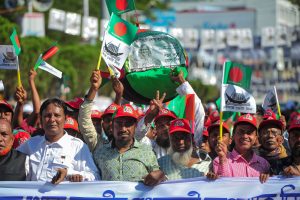Internet restrictions, AI-driven disinformation, and mass arrests have intensified ahead of major elections across Asia. These attacks undermine freedom of expression at a time when elections are supposed to restore or strengthen democratic rule and counter authoritarianism in the region.
In 2023, several laws and regulations were updated in the region, eventually used as tools of censorship during election periods.
Bangladesh passed the Cyber Security Act in September, which critics dismissed as a mere renaming of the Digital Security Act, a draconian law used to detain critics, journalists, and members of the opposition.
Pakistan’s parliament was dissolved in August, but not before it approved amendments to existing laws on blasphemy, national security, and data protection, which gave authorities broad censorship powers.
In December, Indonesia amended the Electronic Information and Transactions Law, which retained provisions on criminal defamation. The amended measure now criminalizes the dissemination of “false statements” that cause “public unrest,” which the International Commission of Jurists criticized as “vague, overbroad, and imprecise.”
These laws enabled ruling parties to expand their “toxic control over news and information.” In Pakistan, social media platforms became inaccessible when the main opposition party held a virtual rally in December and a fundraising event in January. The Pakistan Press Foundation is worried that the recurring shutdown could set a dangerous precedent a month before the country’s general election.
In Bangladesh, a critical news website was blocked a day before the January 7 election. The government has been consistently suppressing online and offline voices. State forces and members of the ruling party violently clashed with those who joined the opposition-led protest on October 28. A general strike was called to condemn the violent dispersal but the government responded by ordering a mass crackdown of opposition leaders and members. At least 20,000 have been arrested and 88,000 face threats of legal prosecution.
Even journalists who covered the rallies in Bangladesh were assaulted by the police. The violence directed against the media continued during the campaign period and on election day as some members of the ruling party were accused of harassing those who were documenting and reporting instances of fraud and poll irregularities.
Muzzling the press and blocking online platforms taints the credibility of the electoral process. In the case of Bangladesh, the opposition boycott and the silencing of dissent contributed to the record low election turnout. Hong Kong’s district election also yielded a low turnout because of the policy to limit candidates to so-called “patriots.” It is linked to the enforcement of the National Security Legislation, which criminalized the work of pro-democracy groups and independent media.
The harmful impact of restricting social media in Pakistan was not only limited to the opposition; it also prevented the public from accessing verified and reliable information. If the trend continues, this could also deprive voters of learning more about election-related concerns. If Pakistani media face state reprisals for reporting about issues that allegedly threaten national security and social harmony, it could lead to the censoring of politically-sensitive topics, such as religious discrimination, the gender gap, the disenfranchisement of transgender voters, corruption, and military meddling in politics.
The recent and coming elections in the region also put into spotlight the alarming use of disinformation and troll operations by various political forces. In Indonesia, whose election is scheduled to take place next month, some “cyber-troops” deployed by candidates spread hate and misogyny, which hinders women’s participation in the election.
In Bangladesh, political parties have been posting online content promoting disinformation, but groups linked to the ruling party and the government clearly got more resources in bombarding the public with deep fake videos attacking the opposition.
Election campaigning in Taiwan was marred by the “multi-pronged cognitive warfare” attributed to China-backed groups accused of endorsing an election outcome in favor of Beijing.
The use of AI by political parties in Pakistan, especially after a detained former prime minister used a clone video to address supporters and voters, ignited debates on consent, reality, and manipulation. AI-generated disinformation could potentially pose a greater danger to vulnerable segments of the population like the LGBTQ community and religious minorities.
A key takeaway from Asia’s recent election experience is the need to revisit existing media laws being weaponized to justify censorship and judicial tyranny. These were clearly designed not to boost democracy and empower citizens, but to deter dissent and punish free speech. Furthermore, measures aimed at ensuring the safety of journalists, especially during heightened moments of election-related uncertainty, must be adopted. Access to online information and services is essential to help voters make informed decisions and facilitate robust conversations between the electorate and public officials.
New challenges have emerged, such as election interference and the aggressive use of AI by candidates, which has led to proposals for stricter regulations. Regulations require sustained and genuine public consultations; we have learned this from how previous disruptions were addressed. Our solutions need to enhance the independence of media, expand civic space, and inspire greater public vigilance to defend democracy.
This article was first published by IFEX, a global network defending and promoting freedom of expression. It is reprinted with permission.

































